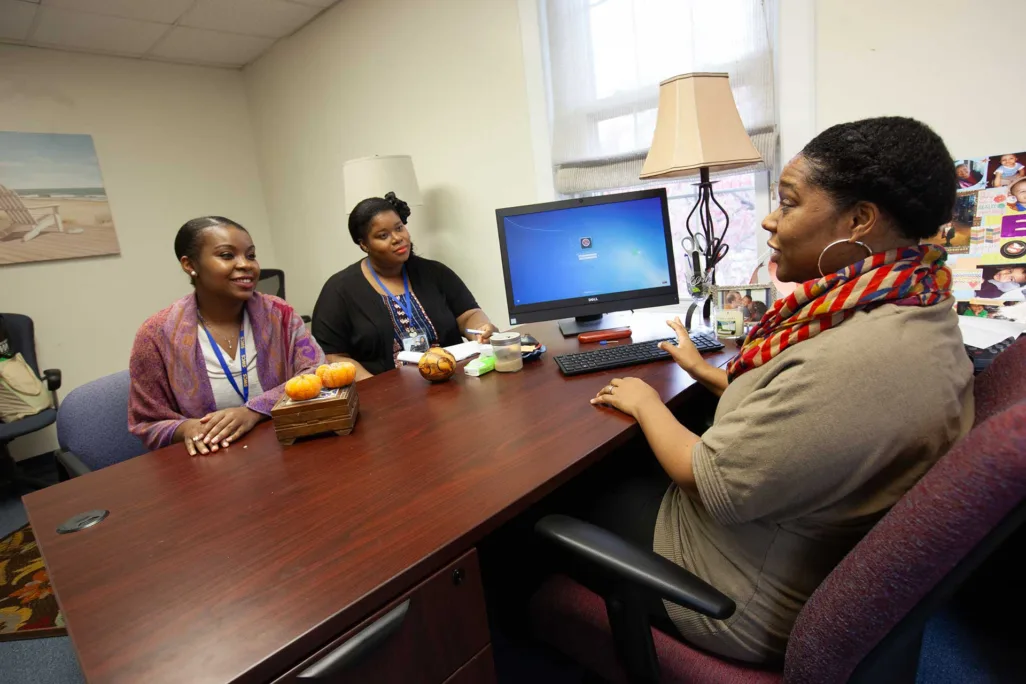Online Graduate Certificate in Practices in Trauma Recovery
Mitigate How Trauma Affects Individuals in Your Community
Trauma is felt across the United States, as 70% of adults have lived through it.1 To assist populations affected by trauma in your community, pursue your Trauma Recovery Certificate online at Widener University. You’ll complete four courses to increase your agility in assisting people experiencing trauma and the challenges left in its wake. We offer the program 100% online, enabling you to continue working while developing important career skills.
Certificate Details
- Courses: 4 (Prerequisite courses required)
- 14-week semesters
- Take classes part-time
- No GRE/GMAT requirement
Learn to Support Trauma Recovery in Social Work
4 Total Courses
CSWE-Accredited
Expert faculty teach each course in the online Trauma Recovery Certificate program, preparing you to work with trauma survivors in your community. The curriculum delves into trauma theory in social work and includes experiential learning opportunities for building valuable clinical social work skills.
While completing the online Trauma Recovery Certificate program, you’ll participate in workshops and supervision seminars via Zoom. Join your faculty and other students for deep dives into trauma-informed care practices and the therapeutic benefits of treatments, receiving helpful feedback on your work.
*Courses with an asterisk are required for Advanced Standing students
Required Practices in Trauma Recovery Courses (Prerequisite Courses Required)
This course builds on conceptual frameworks of human development, with emphasis on the biological, psychological, and environmental influences on social and emotional disturbances. The course will consider diagnosis and assessment within the framework of culture and life cycle changes. The student will acquire a working knowledge of the DSM-5 and its uses in identifying and classifying mental disorders. Students will also be encouraged to view these disorders within the context of the individual’s culture and environment. This course provides students with the Core Competencies and Related Behaviors for conducting assessment of human psychosocial functioning to inform culturally and socially sensitive social work interventions.
Course outcomes:
- Demonstrate social and psychological understanding of emotional and behavioral dysfunction.
- Recognize strengths as well as vulnerabilities in understanding emotional and behavioral dysfunction.
- Understand the differences between a nosology that is derived from human strengths and vulnerability and one that emphasizes “health” and “illness” in the pursuit of social justice in the provision of services.
- Consider ways in which gender, race, ethnicity, social class, sexual orientation, age, physical disability, and other variables contribute to people’s unique strengths and vulnerabilities.
- Understand the uses of classification systems, such as the DSM-5, and think critically about them through alternative perspectives.
- Assess an individual’s functioning within a multi-dimensional framework (biopsychosocial).
- Identify ethical concerns in making judgments about people’s competence.
This advanced standing bridge course is designed to provide advanced standing students with the knowledge base and skills needed for the advanced clinical curriculum courses: SW 630 Clinical Social Work Practice with Individuals, SW 633 Clinical Social Work Practice with Families, and SW 637 Field Instruction III & Seminar. It builds on the generalist social work practice perspective and focuses on the theoretical basis and skills needed to work effectively with individuals and families. Students explore the beginning, middle, and ending stages of practice and the skills needed for creative and effective use of self with individuals and families. Attention is given to ethnicity, race, gender, and sexual orientation. Students also develop knowledge of theory, including ecological, systems, individual and family life cycle, ego psychology, learning, and cognitive theories. Students are introduced to evidence-based practice and qualitative and quantitative methods of research and begin to critically analyze research to inform practice. Class discussions, experiential exercises, role plays, audio/ video recording, assigned readings, and written assignments are directed at integrating the theoretical generalist foundation and developing a range of skills.
Course outcomes:
- Demonstrate knowledge and critically evaluate the theories and models used by social work in understanding client systems.
- Demonstrate an understanding of assessment tools in social work practice (Biopsychosocial, Genogram, and Ecomap).
- Demonstrate ability to monitor interventions and evaluate effects of the interventions focusing on the use of supervision to evaluate one’s own practice.
- Demonstrate an understanding of the stages and skills needed in the rendering of social work service to individuals and families.
- Demonstrate continued development of a professional identity and the integration of social work values and ethics into practice.
- Demonstrate increasing skill in working with diverse populations and understanding the influence of diversity on the helping process.
- Demonstrate the ability to use research evidence to inform practice.
This course concentrates on the etiology and treatment of traumatic symptomatology. Students explore conditions that contribute to the development of acute stress disorder, post-traumatic stress disorder, borderline personality disorder, dissociative disorders, and other disorders of extreme stress. Comorbid conditions, including substance abuse and self-harming behaviors, are considered. The intergenerational, socio-cultural, and societal impact of trauma is explored. A strengths-based approach is emphasized. Readings orient students to the assessment of trauma symptoms, as well as to some generally applicable treatment approaches, and to research on the psychobiology of trauma.
Course outcomes:
- Demonstrate an understanding of the factors that contribute to the development of traumatic symptomatology and stress disorders.
- Demonstrate integration of the knowledge needed to assess traumatic symptomatology.
- Demonstrate an understanding of the impact of trauma on psychobiology.
- Demonstrate a general understanding of a variety of treatment approaches, including the ability to incorporate unique client strengths and resources into chosen treatment approaches.
- Demonstrate the analytical skills needed to integrate theories into trauma treatment.
- Demonstrate the ability to make use of professional literature.
- Demonstrate an understanding of personal and professional strategies for minimizing the risks of vicarious traumatization.
- Demonstrate an understanding of the intergenerational, cultural, and societal impact of trauma.
Focusing on social work practice with families, this course expands systemic thinking by introducing multiple models for family work, including Psychodynamic, Bowen, Narrative, Communication, Contextual, Structural, and Solution-Focused, as well as newer models of family work such as Multidimensional Family Therapy. Using these models and their related theories, students will gain a solid foundation for assessment and intervention with families, knowledge of the family life cycle, and the impact of wider systems on a family’s structure and functioning. The definition of family will be inclusive of many different family forms. Students will examine how cultural issues such as class, race, ethnicity, gender, and sexual orientation must be considered while assessing a family’s presenting issues, unique strengths, and vulnerabilities. Students will learn to think critically about the relevance of particular concepts and interventions for each family system, including whether certain “Western” concepts apply to all families.

Advance as a Trauma-Informed Social Worker
Trauma social workers are positive forces in this field, as they support individuals living with the emotional wounds of distressing experiences. By earning a certificate for trauma-informed care, you’ll gain skills for performing assessments and identifying intervention methods to help clients in crisis. You’ll also establish skills for engaging in clinical social work practice involving children, adults, and families.
Explore CareersValue of a Certificate
Trauma is the root cause of many mental health challenges that individuals face. By pursuing a trauma-informed care certificate, you can learn best practices for assisting clients who have experienced trauma without the long-term commitment of a master’s degree program. Our program consists of two 14-week terms designed for working professionals, allowing you to fit the courses into your busy schedule.
While pursuing your certificate online at Widener, you’ll gain a range of skills that apply immediately to your career. You’ll learn from faculty with expertise in human behavior, trauma treatments, and clinical social work practice during courses that provide a foundation for continuing your education in an online MSW program.
What You’ll Learn
Complete our online certificate program to prepare to assist clients working through the stages of trauma recovery. The program outcomes include the ability to:
- Recognize and assess how trauma and grief might manifest in individuals under a variety of circumstances
- Identify immediate methods of intervention to assist individuals in crisis
- Identify clinical assessments and intervention methods for people who have experienced trauma, despite challenges due to communication difficulties and overshadowing diagnoses
“I feel the training and education I am receiving through the social work program at Widener will lead me into leadership roles in my future career.”
–Brooke Christian, Widener Student
Get Ready to Start Your Application
Application Deadline 12/09/25
Start Date 01/12/2026
Our trauma certificate for social workers begins with a simple, supportive admissions process. If you have questions about completing your application, request information to connect with one of our program managers. We can walk you through each step to complete and share details about how to advance your career by completing trauma training in our online certificate program.
| Online Application Form | Apply Now |
|---|---|
| Degree | Bachelor of Social Work (BSW) from a CSWE-accredited institution |
| Transcripts | Official transcripts from every college-level institution attended |
| Additional Requirements |
|
Invest in Your Future at Widener
$1,000 Cost per Credit
12 Total Credits
Earning your Graduate Certificate in Practices in Trauma Recovery online at Widener is an investment in your future. There are many ways to make online programs fit your budget, including financial aid and education benefits for U.S. military service members and veterans. If your employer offers a tuition reimbursement program, you can reduce your out-of-pocket costs significantly.
Tuition & AidOnline Courses. Tangible Connections.
Experience the connections and community found on Widener’s campus from anywhere. As an online student, you will engage other aspiring students through discussion boards and group projects, accessing opportunities to build your professional network. While completing courses in a convenient format, you will acquire knowledge and skills for becoming a force for good throughout your career.
- Get support from your personal student services coordinator
- Access course materials anytime using your laptop or mobile device
- Learn from a faculty of practitioners and nationally recognized experts
- Gain experience via hands-on learning and career preparation
- Become part of a diverse community of social work professionals
Become an Advocate for Change at Widener
Widener’s Center for Social Work Education empowers you to provide impactful support to diverse populations in your community. Our dedicated faculty mentors engage you through social work experiences that align with diverse career goals, whether you want to advance as a generalist or clinical social worker. We encourage and celebrate the unique traits of each student, fostering growth as a practitioner ready for career advancement. In 2024, Widener was ranked among the Best Schools of Social Work by U.S. News & World Report.
Frequently Asked Questions
Explore our frequently asked questions for in-depth answers. If you don’t find what you’re looking for, reach out to us.
To begin the online Trauma Recovery Certificate program, you’ll need to have a current clinical placement or work in a professional setting. Visit the Program Overview page for additional admission requirements.
The online Trauma Recovery Certificate program prepares you to become a trauma social worker, rehabilitation counselor, and trauma-informed therapist. The courses also explore the treatment of traumatic symptomatology, making the program appeal to professionals interested in learning how to become a trauma counselor. Learn more about your career options by visiting the Careers page.
This online Trauma Recovery Certificate includes 12 credit hours. Visit the Program Overview page to learn more about each course.
Our program managers are here to assist with opportunities to make the online Trauma Recovery Certificate cost-effective. Although scholarships are unavailable for this program, you can pursue a variety of financial aid options, including the following:
- Complete the FAFSA® to determine financial aid eligibility. Our FAFSA code is 003313.
- Apply for a Sallie Mae loan.
For additional tuition details, visit the Program Overview page.
Sources
- The National Social Work Council. “How to Manage Trauma.” Retrieved August 21, 2024, from https://www.thenationalcouncil.org/wp-content/uploads/2022/08/Trauma-infographic.pdf.
